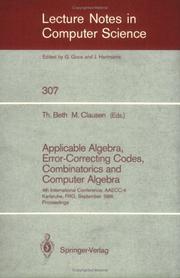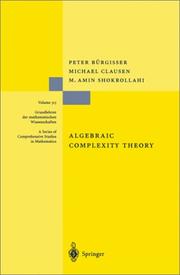| Listing 1 - 2 of 2 |
Sort by
|

ISBN: 354019200X 038719200X 3540391339 Year: 1988 Volume: vol 307 Publisher: Berlin New York London Springer
Abstract | Keywords | Export | Availability | Bookmark
 Loading...
Loading...Choose an application
- Reference Manager
- EndNote
- RefWorks (Direct export to RefWorks)
This volume contains the proceedings of the 4th International Conference on Applicable Algebra, Error-Correcting Codes, Combinatorics and Computer Algebra (AAECC-4), held in Karlsruhe, 23-26 September, 1986. Selected papers which were given at the conference have been reviewed a second time and are presented here.
Artificial intelligence. Robotics. Simulation. Graphics --- Information systems --- 681.3*E4 --- 681.3*I1 --- Coding and information theory: data compaction and compression; formal modelsof communication; nonsecret encoding schemes--See also {681.3*H11} --- Algebraic manipulation (Computing methodologies) --- 681.3*I1 Algebraic manipulation (Computing methodologies) --- 681.3*E4 Coding and information theory: data compaction and compression; formal modelsof communication; nonsecret encoding schemes--See also {681.3*H11} --- Telecommunication. --- Numerical analysis. --- Communications Engineering, Networks. --- Numerical Analysis. --- Mathematical analysis --- Electric communication --- Mass communication --- Telecom --- Telecommunication industry --- Telecommunications --- Communication --- Information theory --- Telecommuting --- Algebra --- Data processing. --- Error-correcting codes (information theory)

ISSN: 00727830 ISBN: 3540605827 3642082289 3662033380 9783540605829 Year: 1997 Volume: 315 Publisher: Berlin: Springer,
Abstract | Keywords | Export | Availability | Bookmark
 Loading...
Loading...Choose an application
- Reference Manager
- EndNote
- RefWorks (Direct export to RefWorks)
The algorithmic solution of problems has always been one of the major concerns of mathematics. For a long time such solutions were based on an intuitive notion of algorithm. It is only in this century that metamathematical problems have led to the intensive search for a precise and sufficiently general formalization of the notions of computability and algorithm. In the 1930s, a number of quite different concepts for this purpose were pro posed, such as Turing machines, WHILE-programs, recursive functions, Markov algorithms, and Thue systems. All these concepts turned out to be equivalent, a fact summarized in Church's thesis, which says that the resulting definitions form an adequate formalization of the intuitive notion of computability. This had and continues to have an enormous effect. First of all, with these notions it has been possible to prove that various problems are algorithmically unsolvable. Among of group these undecidable problems are the halting problem, the word problem theory, the Post correspondence problem, and Hilbert's tenth problem. Secondly, concepts like Turing machines and WHILE-programs had a strong influence on the development of the first computers and programming languages. In the era of digital computers, the question of finding efficient solutions to algorithmically solvable problems has become increasingly important. In addition, the fact that some problems can be solved very efficiently, while others seem to defy all attempts to find an efficient solution, has called for a deeper under standing of the intrinsic computational difficulty of problems.
Numerical solutions of algebraic equations --- Computer science --- Computational Complexity --- Computational complexity --- Computational complexity. --- Complexité de calcul (Informatique) --- Combinatorics. --- Computers. --- Mathematical logic. --- Algorithms. --- Algebraic geometry. --- Theory of Computation. --- Mathematical Logic and Foundations. --- Algorithm Analysis and Problem Complexity. --- Algebraic Geometry. --- Algebraic geometry --- Geometry --- Algorism --- Algebra --- Arithmetic --- Algebra of logic --- Logic, Universal --- Mathematical logic --- Symbolic and mathematical logic --- Symbolic logic --- Mathematics --- Algebra, Abstract --- Metamathematics --- Set theory --- Syllogism --- Automatic computers --- Automatic data processors --- Computer hardware --- Computing machines (Computers) --- Electronic brains --- Electronic calculating-machines --- Electronic computers --- Hardware, Computer --- Computer systems --- Cybernetics --- Machine theory --- Calculators --- Cyberspace --- Combinatorics --- Mathematical analysis --- Foundations
| Listing 1 - 2 of 2 |
Sort by
|

 Search
Search Feedback
Feedback About UniCat
About UniCat  Help
Help News
News